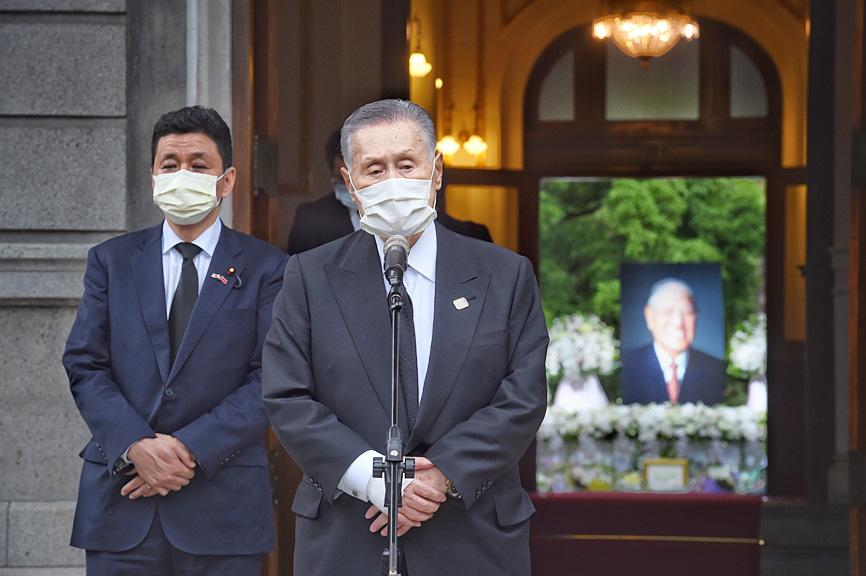A Japanese delegation of parliamentarians from across party lines, led by former Japanese prime minister Yoshiro Mori, yesterday paid their respects to the late former president Lee Teng-hui (李登輝) at a memorial at the Taipei Guest House.
Lee died on July 30, aged 97.
The Japanese delegation arrived at Taipei International Airport (Songshan airport) on a chartered plane at 2:35pm yesterday.

Photo: Fang Pin-chao, Taipei Times
They visited President Tsai Ing-wen (蔡英文) at the Presidential Office Building at 4pm, before heading to the memorial at 5pm.
At the Presidential Office, Tsai thanked the delegation for their visit, and their long-term support and contributions to Japan-Taiwan relations.
Tsai especially thanked Mori for allowing Lee to visit Japan after he stepped down from the presidency, and also thanked Japanese Prime Minister Shinzo Abe and Japanese Deputy Prime Minister Taro Aso for speaking boldly in support of Taiwan’s participation in the World Health Assembly on many occasions.
She said that she hopes Taiwan and Japan can share information on the COVID-19 pandemic and the development of vaccines and medication, and continue to reinforce their good relationship.
Mori delivered a condolence message from Abe and expressed his gratitude and respect for Lee’s contributions to the Japan-Taiwan relationship.
He also said that he hopes the two nations can continue to be friends forever.
To avoid close contact with other people, the delegation, all wearing masks, arrived at the Taipei Guest House after it had been closed to the public at 5pm.
Mori presented flowers and offered his condolences to Lee’s daughter, Annie Lee (李安妮).
Lee Teng-hui made many contributions to international society, and while Japanese lacked confidence after World War II, he always encouraged them to be courageous and proud, Mori said.
He said it would probably take a hour for him to describe his deep relationship with Lee Teng-hui, but he always believed that he made the correct decision when approving his visa application to receive medical treatment in Japan after he stepped down from the presidency, even though China opposed it and the Japanese government was concerned.
The delegation left the Taipei Guest House at about 5:50pm.
Former Presidential Office secretary-general Huang Kun-huei (黃昆輝) said that the visit symbolizes the close relationship between Taiwan and Japan.
During his 12-year presidency and after he left office, Lee Teng-hui always promoted better understanding between Taiwan and Japan, building the friendship between the two nations, he said.
Additional reporting by Lin Hsiao-yun and CNA

A magnitude 5.6 earthquake struck off the coast of Yilan County at 12:37pm today, with clear shaking felt across much of northern Taiwan. There were no immediate reports of damage. The epicenter of the quake was 16.9km east-southeast of Yilan County Hall offshore at a depth of 66.8km, Central Weather Administration (CWA) data showed. The maximum intensity registered at a 4 in Yilan County’s Nanao Township (南澳) on Taiwan’s seven-tier scale. Other parts of Yilan, as well as certain areas of Hualien County, Taipei, New Taipei City, Taoyuan, Hsinchu County, Taichung and Miaoli County, recorded intensities of 3. Residents of Yilan County and Taipei received

TRUST: The KMT said it respected the US’ timing and considerations, and hoped it would continue to honor its commitments to helping Taiwan bolster its defenses and deterrence US President Donald Trump is delaying a multibillion-dollar arms sale to Taiwan to ensure his visit to Beijing is successful, a New York Times report said. The weapons sales package has stalled in the US Department of State, the report said, citing US officials it did not identify. The White House has told agencies not to push forward ahead of Trump’s meeting with Chinese President Xi Jinping (習近平), it said. The two last month held a phone call to discuss trade and geopolitical flashpoints ahead of the summit. Xi raised the Taiwan issue and urged the US to handle arms sales to

Taiwan has secured another breakthrough in fruit exports, with jujubes, dragon fruit and lychees approved for shipment to the EU, the Ministry of Agriculture said yesterday. The Animal and Plant Health Inspection Agency on Thursday received formal notification of the approval from the EU, the ministry said, adding that the decision was expected to expand Taiwanese fruit producers’ access to high-end European markets. Taiwan exported 126 tonnes of lychees last year, valued at US$1.48 million, with Japan accounting for 102 tonnes. Other export destinations included New Zealand, Hong Kong, the US and Australia, ministry data showed. Jujube exports totaled 103 tonnes, valued at

BIG SPENDERS: Foreign investors bought the most Taiwan equities since 2005, signaling confidence that an AI boom would continue to benefit chipmakers Taiwan Semiconductor Manufacturing Co’s (TSMC, 台積電) market capitalization swelled to US$2 trillion for the first time following a 4.25 percent rally in its American depositary receipts (ADR) overnight, putting the world’s biggest contract chipmaker sixth on the list of the world’s biggest companies by market capitalization, just behind Amazon.com Inc. The site CompaniesMarketcap.com ranked TSMC ahead of Saudi Aramco and Meta Platforms Inc. The Taiwanese company’s ADRs on Tuesday surged to US$385.75 on the New York Stock Exchange, as strong demand for artificial intelligence (AI) applications led to chip supply constraints and boost revenue growth to record-breaking levels. Each TSMC ADR represents